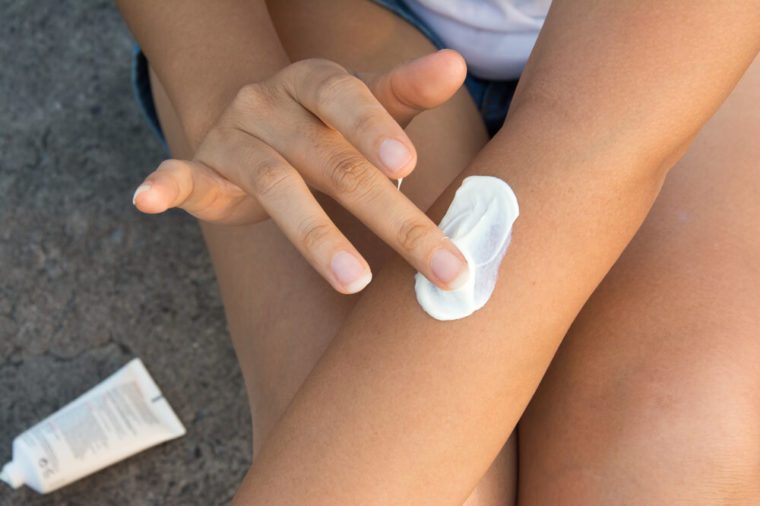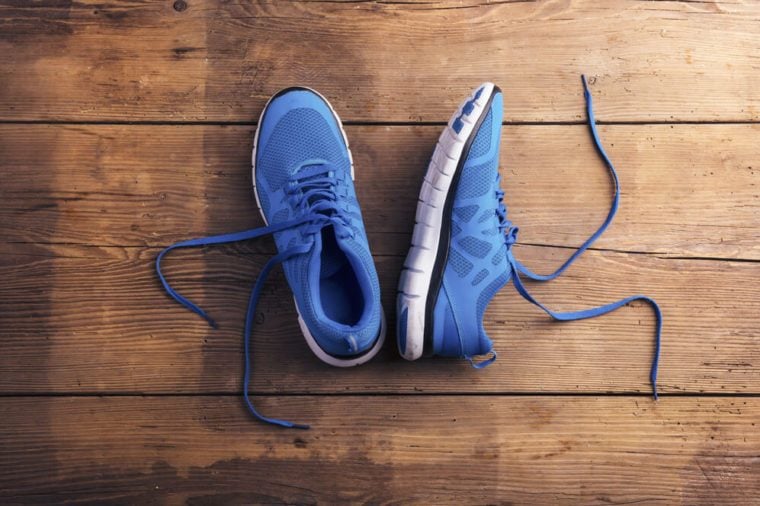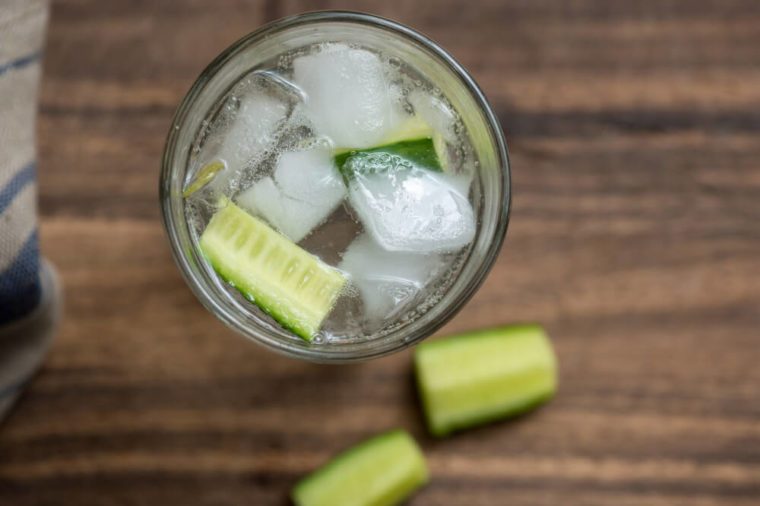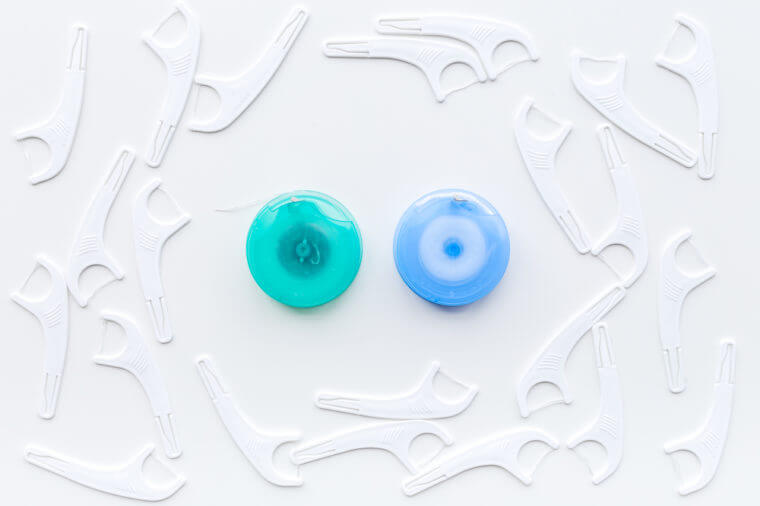Floss
Frequent romps in the hay have the potential to add on a few years to your life. “If you are able to achieve orgasm during sexual intercourse, you will reap the benefits of the feel-good hormone oxytocin as it is released,” says Shanna Levine, MD, a primary care physician at Mount Sinai. In one study, mortality risk was 50 percent lower in those who had frequent orgasms; for men, orgasms have also been associated with lower prostate cancer risk. Plus, studies show those in happy marriages (which sex is usually part of) tend to live longer. “We know that positive and healthy relationships improve physical and emotional health,” Dr. Levine says. Find out 15 science-backed signs you could live to 100.
Get a pet

Close relationships that add on years to your life can be of the furry sort, too. A recent study showed dog owners were 33 percent less likely to die early. “Dogs have been shown to improve longevity and reduce heart disease, but the mechanism of why is unclear,” Dr. Levine says. It could be because owners take their dogs for frequent walks and therefore get more exercise; or cuddling with your fluffball could reduce stress and release oxytocin. Read about more ways pets make you smarter, stronger, and more resistant to stress.
Go Mediterranean
Research has shown those who eat this diet have longer telomeres, the protective caps on the end of chromosomes, which slows aging. Another study found a 20 percent increased chance of living longer on the Mediterranean diet, which equals about two to three years according to the researcher. Eating the Mediterranean way means lots of vegetables, fruit, fish, nuts, and whole grains without a lot of red meat or processed foods. Especially important for longevity, according to research: nutrient-packed veggies. “Ideally everyone should eat five servings of fruits and vegetables a day,” Dr. Levine says. “This equals 1/2 cup of cooked vegetables or one cup of raw vegetables.” Find out easy tricks for making your diet more Mediterranean.
Drink wine

Moderate consumption has been shown to reduce the risk of cardiovascular mortality. “Life expectancy was about five years longer in men who consumed wine compared with those who did not use alcoholic beverages,” the study authors wrote. Red wine contains antioxidants that may increase longevity, and may also help reduce stress. But, if you don’t already drink, it might not be best to start just for the health benefits, as you never know if you may be affected by alcohol abuse disorder—and heavy drinking definitely has negative health effects. According to the U.S. Dietary Guidelines, stick with no more than one drink a day for women and two for men. This is what happens when you drink a glass of wine every night.
Think positive

Could just thinking hopefully about living longer actually make it happen? Maybe, because having a positive attitude about life has been shown to increase it. “Studies show that individuals who practice positive thinking live an average of 7.5 years longer than those who don’t,” says psychologist Deborah Serani, PsyD, award-winning author of Depression in Later Life. “Positive people report higher levels of happiness and more meaningful connections to others. Some of the physical benefits of positive thinking include lower blood pressure, better sleep, and a stronger immune system.” Here’s how to develop a positive attitude in six easy steps.
Get the right amount of zzz’s

Getting the recommended seven to nine hours of sleep (seven to eight hours for over-65 year olds) a night is crucial for your body to repair and renew itself, which can add on a few years to your lifespan. “An analysis was conducted of studies on sleep duration and mortality, totaling over a million adults,” says sleep expert Richard Shane, PhD, creator of the Sleep Easily method. “The analysis found that short sleep of six hours or less was associated with a 12 percent increased risk of death, and long sleep of nine or more hours was associated with a 30 percent increased risk of death.” Try these little changes to make your sleep better in just one day.
Protect yourself from the sun

Skin cancer affects more people than all other cancers combined, with one person dying from it every hour. “Using sunscreen every day decreases your risk of all skin cancers, including the most fatal form, melanoma,” says dermatologist Whitney Bowe, MD, author of the Beauty of Dirty Skin. In addition to the cancer risk, an Australian study showed people who apply sunscreen daily showed 24 percent less skin aging over 4.5 years. However, “wearing sunscreen is the first line of defense for healthy skin, but it is not enough,” Dr. Bowe says. “UPF clothing and swimsuits, antioxidant supplements like Heliocare that protect your skin from sun damage from the inside-out, and seeking shade during peak sun hours, are also critical to maintaining skin that’s healthy and skin-cancer free.” Find out more about the supplement that prevents sun damage.
Be social

Want to live to 100? Maintaining healthy friendships can help you expand your life by years. “A 2010 research study with over 300,000 participants across all ages showed that adults get a 50 percent boost in longevity if they have a solid social network,” Dr. Serani says. Plus, an Australian study of people over 100 years old found that the majority had close contact with friends and family. “So surrounding yourself with others can offer great comfort,” Dr. Serani says. “The tricky thing here is to find people who share your passions, are not toxic or suck the life out of you, because, of course, that’s stress inducing!” Here are the secrets to making friendships really last forever, according to lifelong friends.
Drink coffee

Over the years, whether coffee is good or bad for you has gone back and forth—but now the research is solidly on the life-extending side. “Two recent studies demonstrated that those who drank two to four cups a day had an 18 percent lower risk of death than those who did not drink coffee,” Dr. Levine says. According to an expert on medical statistics, this would add about nine minutes a day to your life. Decaf coffee has these benefits, too, so it could be java’s antioxidant or anti-inflammatory properties that are responsible for the reduced risk of health problems seen in the research, including heart disease, cancer, and diabetes. Read more on the truth about how coffee affects your health.
Get moving

It’s not a shock that exercise lengthens your life, but what kind and how much have life-extending benefits? “The magic number is 150 minutes of exercise a week to improve longevity and give you a 31 percent decrease in risk of dying,” Dr. Levine says. “The type of exercise should be moderate, which means elevated heart rate and sweating.” Exercise can prevent elevated blood pressure, high cholesterol, dementia, and early death. “Walking is great, however if my patient can tolerate more intense exercise, than I always encourage it,” she says. Any amount you can get in is beneficial: One study showed brisk walking for 450 minutes a week added 4.5 years of life, but even 75 minutes added almost two years. These two exercises can cut your risk of heart disease in half.
Reduce stress

Being stressed doesn’t just take a mental toll—it takes a physical one that can shorten your life, according to research. One study found that chronic stress cut lifespans short by four to eight years. Taking anti-stress measures can reverse this trend. “Negative thinking increases the stress hormones, cortisol and adrenaline, which make us restless and irritable,” Dr. Serani says. “But if you learn to offset half-empty thoughts with hall-full ones, your body creates more feel-good hormones, like norepinephrine, endorphins, dopamine, serotonin, and oxytocin.”
Chug water

“In the last 100 years, we are lucky to have a clean water system, and that is one of many reasons we believe humans are living up to 30 years longer than they were in the 20th century,” Dr. Levine says. “Our bodies are 75 percent water, so adequate water intake is essential.” According to a University of Illinois study, people who drink water regularly consume fewer calories, less sweetened beverages, and less fat, sugar, and salt—all of which can lead to weight loss and improved health for years to come. There aren’t official guidelines on how much to drink, but the general rule is eight 8-ounce glasses a day. Here’s how your body changes when you start drinking enough water.
Keep your brain active

You need to keep your brain as well as your body moving to prevent declines in mental function that can shorten lifespans. One study in the New England Journal of Medicine found that after five years, those elderly subjects who read, played board games, or musical instruments were less likely to have developed dementia or Alzheimer’s. Another study from the National Institute on Aging followed participants for 4.5 years, and those who spent the most time (every day or every other day) reading, doing puzzles, playing cards, or doing crosswords had a 47 percent reduced risk than those who least frequently participated in those activities. Doing these nine things can cut your risk of dementia by 35 percent.
Be mindful

Practicing mindfulness meditation can help you literally stop and smell the flowers—which not only extends your quality of life, but the quantity. At a cellular level, research has shown that meditation can actually help slow down aging and add years. One study found participants who had a 12-minute meditation session for eight weeks already showed lengthening telomeres (a sign of slowing aging). “Make sure you linger a minute or two in the moment—your neurochemistry will become flooded with more feel-good hormones than stress-related ones,” Dr. Serani says.
IMAGES BY


 using WordPress and
using WordPress and
No responses yet